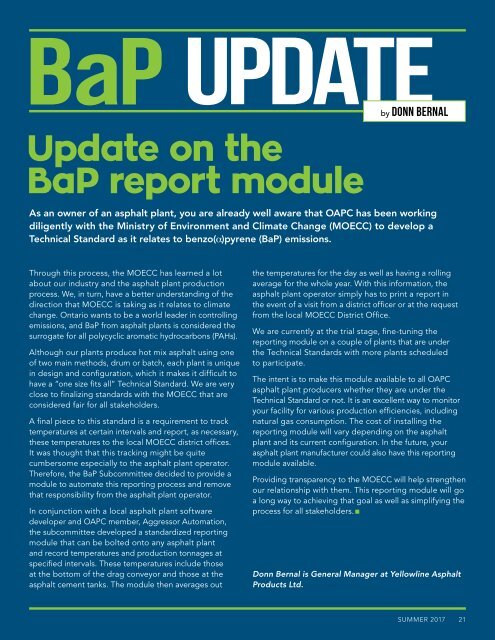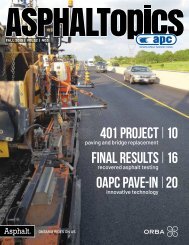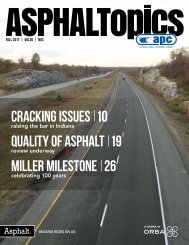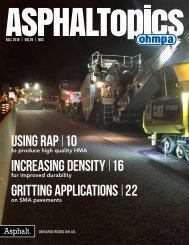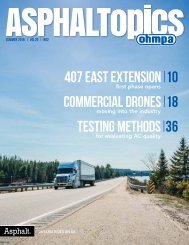ASPHALTopcs | Summer 2017 | VOL 30 | NO 2
Create successful ePaper yourself
Turn your PDF publications into a flip-book with our unique Google optimized e-Paper software.
Bap Update<br />
by donn bernal<br />
Update on the<br />
BaP report module<br />
As an owner of an asphalt plant, you are already well aware that OAPC has been working<br />
diligently with the Ministry of Environment and Climate Change (MOECC) to develop a<br />
Technical Standard as it relates to benzo(α)pyrene (BaP) emissions.<br />
Through this process, the MOECC has learned a lot<br />
about our industry and the asphalt plant production<br />
process. We, in turn, have a better understanding of the<br />
direction that MOECC is taking as it relates to climate<br />
change. Ontario wants to be a world leader in controlling<br />
emissions, and BaP from asphalt plants is considered the<br />
surrogate for all polycyclic aromatic hydrocarbons (PAHs).<br />
Although our plants produce hot mix asphalt using one<br />
of two main methods, drum or batch, each plant is unique<br />
in design and configuration, which it makes it difficult to<br />
have a “one size fits all” Technical Standard. We are very<br />
close to finalizing standards with the MOECC that are<br />
considered fair for all stakeholders.<br />
A final piece to this standard is a requirement to track<br />
temperatures at certain intervals and report, as necessary,<br />
these temperatures to the local MOECC district offices.<br />
It was thought that this tracking might be quite<br />
cumbersome especially to the asphalt plant operator.<br />
Therefore, the BaP Subcommittee decided to provide a<br />
module to automate this reporting process and remove<br />
that responsibility from the asphalt plant operator.<br />
In conjunction with a local asphalt plant software<br />
developer and OAPC member, Aggressor Automation,<br />
the subcommittee developed a standardized reporting<br />
module that can be bolted onto any asphalt plant<br />
and record temperatures and production tonnages at<br />
specified intervals. These temperatures include those<br />
at the bottom of the drag conveyor and those at the<br />
asphalt cement tanks. The module then averages out<br />
the temperatures for the day as well as having a rolling<br />
average for the whole year. With this information, the<br />
asphalt plant operator simply has to print a report in<br />
the event of a visit from a district officer or at the request<br />
from the local MOECC District Office.<br />
We are currently at the trial stage, fine-tuning the<br />
reporting module on a couple of plants that are under<br />
the Technical Standards with more plants scheduled<br />
to participate.<br />
The intent is to make this module available to all OAPC<br />
asphalt plant producers whether they are under the<br />
Technical Standard or not. It is an excellent way to monitor<br />
your facility for various production efficiencies, including<br />
natural gas consumption. The cost of installing the<br />
reporting module will vary depending on the asphalt<br />
plant and its current configuration. In the future, your<br />
asphalt plant manufacturer could also have this reporting<br />
module available.<br />
Providing transparency to the MOECC will help strengthen<br />
our relationship with them. This reporting module will go<br />
a long way to achieving that goal as well as simplifying the<br />
process for all stakeholders.<br />
Donn Bernal is General Manager at Yellowline Asphalt<br />
Products Ltd.<br />
SUMMER <strong>2017</strong> 21


